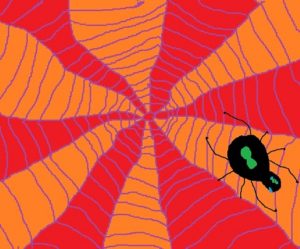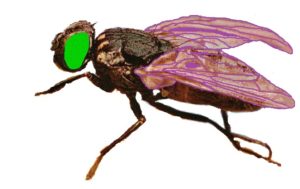By Mary Howitt

“Will you walk into my parlor?” said the Spider to the Fly,
“‘Tis the prettiest little parlor that ever you did spy;
The way into my parlor is up a winding stair,
And I have many curious things to show you when you are there.”
“Oh no, no,” said the Fly, “to ask me is in vain;
For who goes up your winding stair can ne’er come down again.”
“I’m sure you must be weary, dear, with soaring up so high;
Will you rest upon my little bed?” said the Spider to the Fly.
“There are pretty curtains drawn around, the sheets are fine and thin;
And if you like to rest awhile, I’ll snugly tuck you in!”
“Oh no, no,” said the little Fly, “for I’ve often heard it said
They never, never wake again, who sleep upon your bed!”
Said the cunning Spider to the Fly, “Dear friend, what can I do
To prove that warm affection I’ve always felt for you?
I have within my pantry, good store of all that’s nice;
I’m sure you’re very welcome – will you please take a slice?”
“Oh no, no,” said the little Fly, “kind sir, that cannot be,
I’ve heard what’s in your pantry, and I do not wish to see!”
“Sweet creature,” said the Spider, “you’re witty and you’re wise;
 How handsome are your gauzy wings, how brilliant are your eyes!
How handsome are your gauzy wings, how brilliant are your eyes!
I have a little looking-glass upon my parlor shelf;
If you step in one moment, dear, you shall behold yourself.”
“I thank you, gentle sir,” she said, “for what you’re pleased to say;
And bidding good morning now, I’ll call another day.”
The Spider turned him round about, and went into his den,
For well he knew the silly Fly would soon come back again;
So he wove a subtle web in a little corner sly,
And set his table ready to dine upon the Fly.
then he came out to his door again, and merrily did sing,
“Come hither, hither, pretty Fly, with the pearl and silver wing;
Your robes are green and purple, there’s a crest upon your head;
Your eyes are like the diamond bright, but mine are as dull as lead.”
Alas, alas! how very soon this silly little Fly,
Hearing his wily, flattering words, came slowly flitting by;
With buzzing wings she hung aloft, then near and nearer drew, –
Thinking only of her brilliant eyes, and green and purple hue;
Thinking only of her crested head – poor foolish thing! At last,
Up jumped the cunning Spider, and fiercely held her fast.
He dragged her up his winding stair, into his dismal den
Within his little parlor – but she ne’er came out again!
And now, dear little children, who may this story read,
To idle, silly, flattering words, I pray you ne’er heed;
Unto an evil counsellor close heart, and ear, and eye,
And take a lesson from this tale of the Spider and the Fly.
Mary Howitt, (1799–1888) published The Spider and the Fly in 1829. It is a cautionary tale about the use of flattery and charm to mask evil and unsavory intentions. Although written so long ago, the poem is as relevant today as the day it was written. That is why I have included the poem here in FabulousFables.com. The poem’s lesson is timeless.
David Madrid
Contact: David Madrid



 How handsome are your gauzy wings, how brilliant are your eyes!
How handsome are your gauzy wings, how brilliant are your eyes!![365px-Aesop_woodcut_Spain_1489[1]](https://www.fabulousfables.com/wp-content/uploads/2016/04/365px-Aesop_woodcut_Spain_14891-183x300.jpg)
